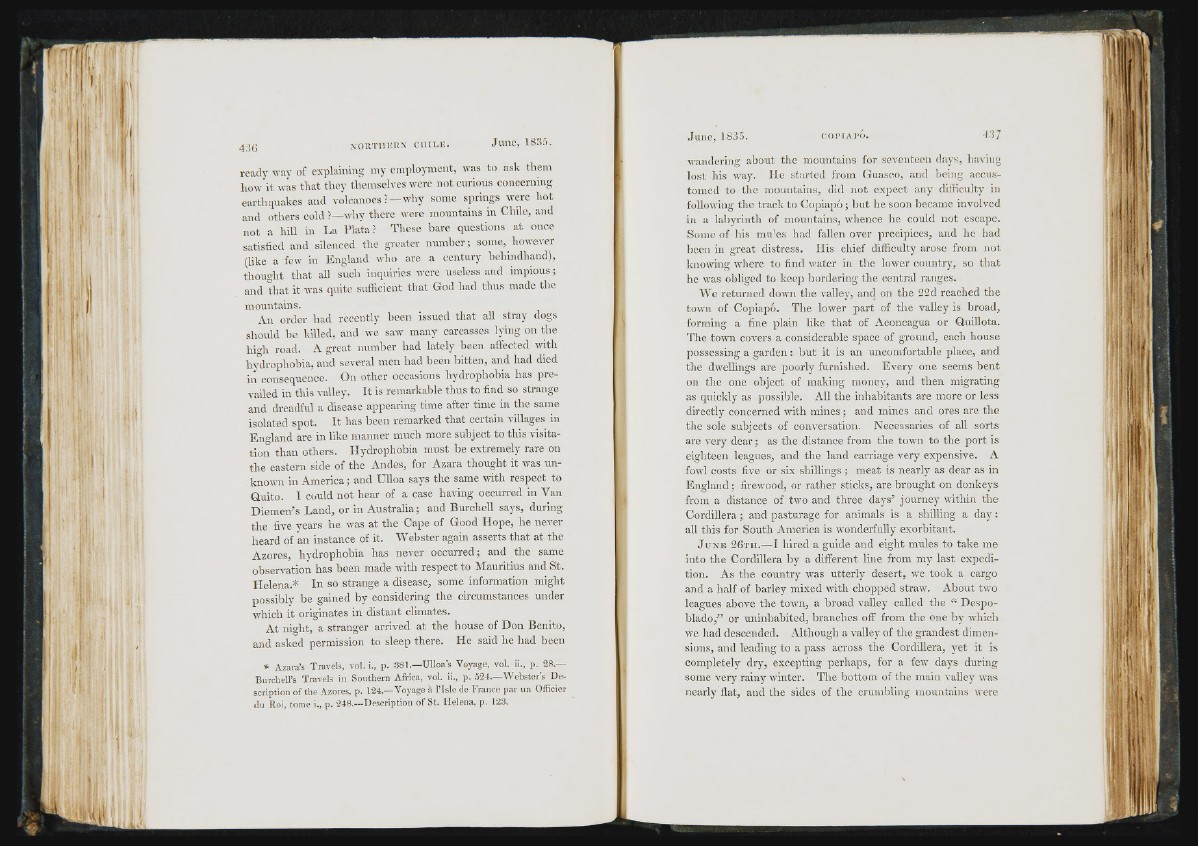
4 .i( j X O K T l lK R X C l l I L U . June, 1835.
reudv way of explaiuiug; my employment, was to ask them
how "it wiis that they tiiemselves were not curious concerning
eartliquakes and volcanoes ? — wliy some springs were liot
and others cold ?—wiiy tliere were mountains in Chile, and
not a liiil in La Rata? These bare questions at once
satisfied and silenced the greater number; some, however
(like a few in England wlio are a century behindiiand),
thought that all such inquiries were useless and impious;
and that it was quite, sufficient tliat God liad thus made tiie
mountains.
An order had recently been issued that all stray dogs
should be killed, and we saw many carcasse.s lying on the
hirii road. A great number had lately been affected with
hydrophobia, and several men had been bitten, and liad died
in consequence. On other occasions hydrophobia has prevailed
in this valley. It is remarkable thus to find so strange
and dreadful a disease appearing time after time in the same
isolated spot. It has been remarked that certain villages in
England are in like manner much more subject to this visitation
than others. Hydrophobia must be extremely rare on
the eastern side of the Andes, for Azara thought it was unknown
in America; and Ulloa says the same with respect to
Quito. I could not hear of a case having occurred in Van
Diemen's Land, or in Australia; and Burchell says, during
the five years he was at the Cape of Good Hope, he never
heard of "an instance of it. Webster again asserts that at the
Azores, hydrophobia has never occurred; and the same
observation has been made witli respect to Mauritius and St.
Helena.* In so strange a disease, some information might
possibly be gained by considering the circumstances under
which it originates in distant climates.
At night, a stranger arrived at the house of Don Benito,
and asked permission to sleep there. He said he had been
» A z a ra ’s T r a v e ls , v o l. i., p . 3 8 1 .— U llo a 's Vo y ag e, vo l. ii., p . 2 8 .—
B u r c h e ll’s T ra v e ls in S o u th e rn Afric a , vo l. ii., p . 5 2 4 .— W e b s t e r ’s D e s
c rip tio n o f th e Azo re s, p . 124.— Vo y ag e a I’I sle d e F r a n c e p a r u n Officier
d ll R o i, tom e i., p . 2 4 8 .— D e s c r ip tio n o f S t. H e le n a , p . 123.
waiideriiig about the mountains for seventeen days, liaving
lost his way. l ie started from (Juasco, and being accustomed
to the mountains, did not expect any difficulty in
following tlie track to Copiaiio; but he soon liecame involved
in a labyrinth of mountains, wlience lie could not escape.
Some of liis nudes had fallen over precipices, and lie liad
lieen in great distress. His cliief difficulty arose from not
knowing where to find water in the lower country, so that
he was obliged to keep liordering the central ranges.
We returned down the valley, and on tlie 22d reached tlie
town of Copiapo. Tlie lower part of the valley is broad,
forming a fine plain like that of Aconcagua or Quillota.
The town covers a considerable space of ground, each house
possessing a garden: but it is an uncomfortalile place, and
the dwellings are poorly furnished. Every one seems bent
on the one object of making money, and then migrating
as quickly as possible. All the inliabitants are more or less
directly concerned with mines; and mines and ores are tlie
tiie sole subjects of conversation. Necessaries of all sorts
are very dear; as the distance from the town to the port is
eighteen leagues, and the land carriage very expensive. A
fowl costs five or six shillings; meat is nearly as dear as in
England; firewood, or ratlier sticks, are brought on donkeys
from a distance of two and three days’ journey within the
Cordillera; and pasturage for animals is a shilling a day:
all this for South America is wonderfully exorbitant.
J u n e 2 G t h .— I hired a guide and eight mules to take me
into the Cordillera by a different line from my last expedition.
As the country was utterly desert, we took a cargo
and a lialf of barley mixed with chopped straw. About two
leagues above the town, a broad valley called the “ Despoblado,”
or uiiinhahited, branches off from the one by which
we had descended. Although a valley of the grandest dimensions,
and leading to a pass across the Cordillera, yet it is
completely dry, excepting perhaps, for a few days during
some very rainy winter. The bottom of the main valley was
nearly flat, and the sides of the crumbling mountains were
■i I